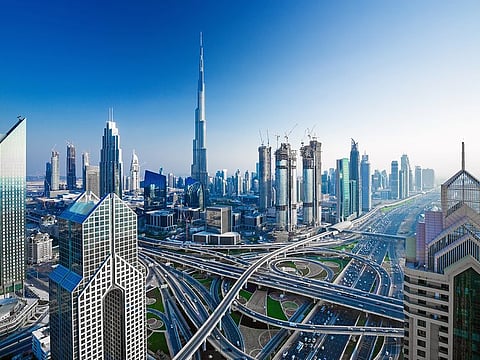UAE economy could hit 4.9% growth in 2022, says IIF
Oil price gains and sustained demand will work to UAE's economy advantage

Also In This Package
Dubai: The UAE economy is rebounding fast from the downturn caused by COVID-19 and the prolonged decline in oil prices, according to Institute of International Finance (IIF), a grouping of banks and financial institutions. The economy is thus expected to grow 4.9 per cent next year and higher than the UAE Central Bank's latest forecast of 4.2 per cent.
“We expect real GDP growth to pick up to 2.2 per cent in 2021 and 4.9 per cent in 2022, supported by one of the highest vaccination rates in the world, recovery in oil production, rebound in tourism, activities related to the rescheduled Expo 2020 in Dubai, and the September strategic vision to stimulate the economy,” said Garbis Iradian, Chief Economist - MENA, IIF.
The UAE’s growth strategy includes a series of new investments and measures to ease residency rules for expats, which will enhance its status as a global hub for business and finance, and an attractive tourist destination, according to IIF. Consumer prices are forecast to remain broadly flat this year as compared with a deflation of 2.1 per cent in 2020, on the back of higher global commodity prices and recovery in domestic demand.
We expect real GDP growth to pick up to 2.2% in 2021 and 4.9% in 2022, supported by one of the highest vaccination rates in the world, recovery in oil production, rebound in tourism, activities related to the rescheduled Expo 2020 in Dubai, and the strategic vision to stimulate the economy

Resilient banking
Banks remain adequately capitalized with a 16.4 per cent Tier 1 ratio, while the nonperforming loan (NPL) ratio edged up to 8.2 per cent in the second quarter of 2021. The Central Bank has recently announced gradual withdrawal of COVID-19 support measures, which were effective in mitigating the adverse impact of the pandemic. While the loan deferral scheme will expire by end-2021, the zero cost lending facility will continue to be used to provide new loans through mid-2022.
Higher spending
The UAE is pursuing a modestly expansionary fiscal stance given its large financial buffers, spare capacity, and higher oil prices. “Despite the higher spending, the consolidated fiscal deficit of 7.1 per cent of GDP in 2020, will shift to surpluses of around 1per cent in 2021 and 2022, supported by the large increase in hydrocarbon revenues on the back of the surge in oil and natural gas prices,” said Iradian.
The external position will remain very strong, with the persistent current account surplus widening to 7 per cent of GDP in 2021 and 10 per cent of GDP in 2022. “We expect FDI inflows to increase further from $20 billion in 2020 to $22 billion 2022," he added. "Elevated FDI in inflows in the UAE is explained by the friendly business environment, excellent infrastructure, predictable policies, and political stability."
Gross public foreign assets (official reserves plus the funds with sovereign wealth funds) of the UAE are forecast to increase to over $1 trillion - 244 per cent of GDP - in 2022. “Privatizing non-strategic GREs and enforcing competition laws and regulations on all entities would improve efficiency and raise productivity,” said Iradian.
Sign up for the Daily Briefing
Get the latest news and updates straight to your inbox









